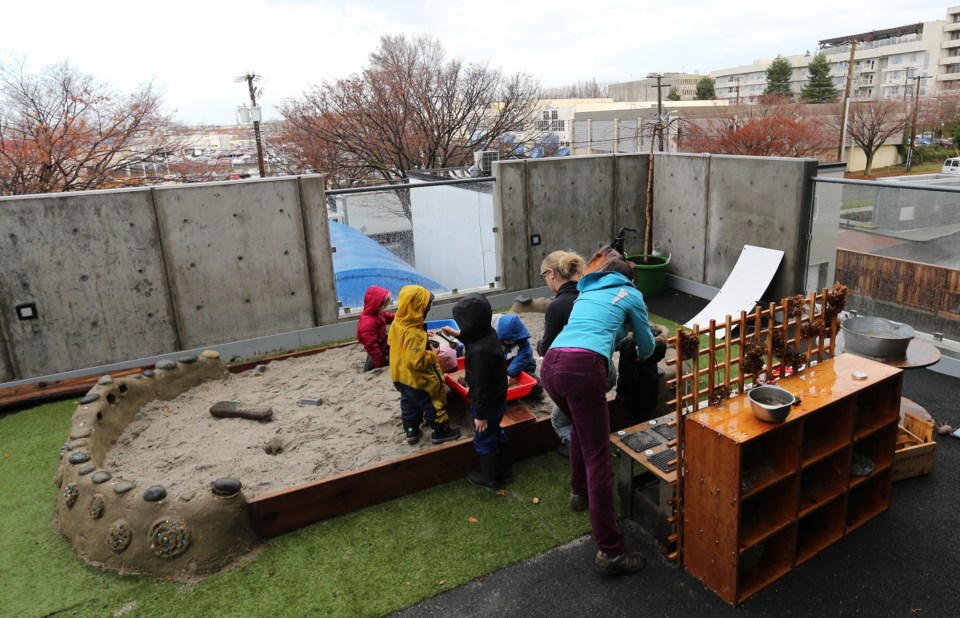Early child-care educators are hopeful that some of the money that the federal government is giving to B.C. for child-care programs will improve the situation for children with special needs.
The federal government announced Friday that $153 million over three years will help B.C. reduce fees for parents, create 1,370 new infant and toddler spaces and provide bursaries and grants to recruit new early-childhood educators.
Katrine Conroy, B.C.’s minister of children and family development, said part of the federal investment will help reduce wait times for children with special needs and improve culturally based programs for Indigenous children.
Conroy, Minister of State for Child Care Katrina Chen and North Vancouver MP Jonathan Wilkinson, made the announcement surrounded by children at Vancouver’s Phil Bouvier Family Centre.
Meagan Brame, an Esquimalt councillor who runs Saxe Point Day Care, said while wait-lists are long, parents of children with special needs have even more difficulties finding care.
Brame said in one case she had to turn away a three-year-old child with high needs because his parents had yet to secure funding for a one-on-one support worker.
“It became a safety issue because, when you’re only dealing one-on-one with one child, there are seven other children who aren’t getting the attention.”
A similar situation played out at Victoria’s Cridge Centre for the Family. The centre was not able to take a special-needs child who ended up having to wait a year until funding came through for a support worker, said spokeswoman Joanne Specht.
“For families who are struggling to find resources for that child, a year is a long time,” Specht said.
“We’d love to take these children, but knowing they’re special needs adds a whole other layer as to whether we can take them.”
The Cridge Centre for the Family has spaces for about 200 kids, and there are about 150 on the wait-list, Specht said.
In Greater Victoria, high-needs children are assessed by medical professionals at Queen Alexandra Centre for Children’s Health through the supported child development programs.
Children who are born with a genetic disability such as Down syndrome often get help right away, Specht said, but children whose special needs are discovered once they enter child care — which is common among children on the autism spectrum — are put on a wait-list for support.
It can take up to 18 months for a child to receive funding for a support worker, Brame and Specht agreed.
“They can give us all the extra money they want but if there’s no staff to work with them, that’s the problem,” Brame said.
The Ministry of Children and Family Development did not have a breakdown of how much of the federal contribution will be earmarked for supported child development programs across the province.
Another problem, said Specht, is the lack of qualified early child-care educators (ECEs).
“We’re thrilled about the funding, both provincially and federally, but even if the funding is available, we can’t find ECEs to hire to take care of the kids,” Specht said.
Wages of between $15 and $17 an hour don’t provide enough of an incentive for people to make long-term careers as early-childhood educators, she said.
“It’s a really difficult situation that not just the Bridge but all child care providers are facing.”
In Tuesday’s provincial budget, the NDP government promised to spend $1 billion over three years to create 22,000 new child-care spaces, invest in early child-care education programs, provide subsidies to parents and incentives to day care providers to lower fees.
Starting in April, licensed child-care providers will be able to apply for up to $350 a month per child-care space in order to reduce fees, with the highest amount available to day cares for infants and toddlers.
Specht said it’s unclear what conditions the government will apply to that funding and whether day cares can use the money to raise wages.
“Something needs to shift in our culture to put value back into being a child-care worker so people want to go into that profession and stay in that profession,” she said.



